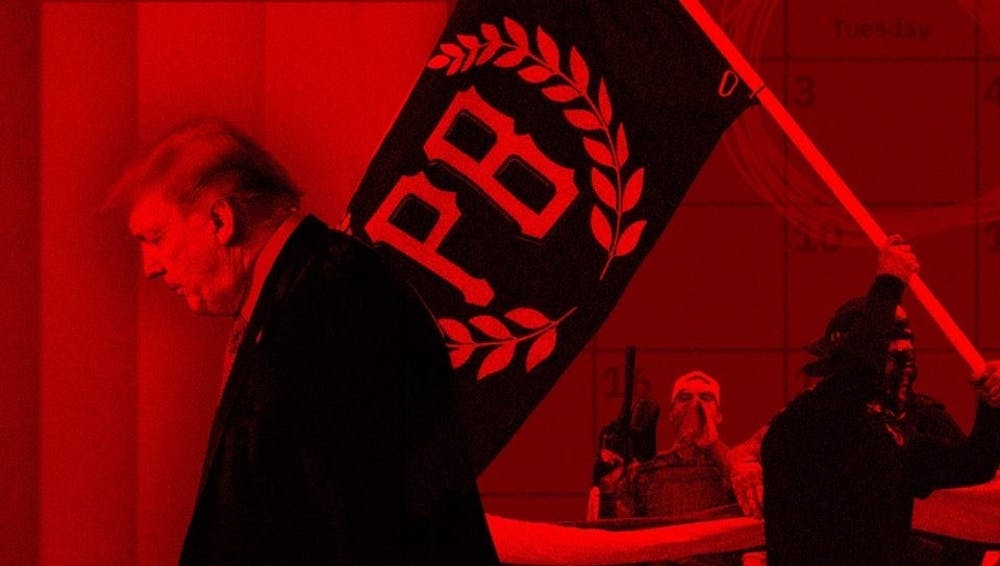Last week President Donald Trump refused to explicitly condemn the Proud Boys during the presidential debate, a position the president backtracked on two days later. The Nation obtained an FBI intelligence report the same day warning of a potential “flashpoint” for white supremacist violence between now and the presidential inauguration in January. The findings focus on Dallas, but IU’s complacency raises concern about its preparedness to handle a similar violent extremist threat.
In 2018, Indiana experienced the largest number of reported hate crimes in two decades. White supremacist sentiment is growing at IU despite a 33% reduction in hate groups statewide over the last three years.
Predominant groups such as the Proud Boys and the Ku Klux Klan operate on and around IU’s campus along with four other groups. An additional eight groups are active throughout central Indiana.
IU has a responsibility to spearhead anti-racist reform, but the university instead relies on a strategy of performative activism.
The IU Board of Trustees recently voted to remove former IU President David Starr Jordan’s name from spaces throughout campus. Cutting ties with a renowned eugenicist is absolutely necessary, but it is more symbolic than reformative.
IU’s verbal commitment to diversity tells a different story than its financial one.
While the average budget for the IU-Bloomington Department of African American and Diaspora Studies decreased 33% over the past decade, the IU Police Department’s budget increased 22% with a 17% increase since 2018 alone. The budget for IUPD surpassed $5 million for the first time in the 2020-2021 university budget.
IU’s symbolic efforts mean little if the university undermines its commitment in practice. The university invests in an institution whose mere creation stemmed from a desire to control Black bodies instead of programs necessary to promote an anti-racist education. Flaunting enrollment diversity without substantiating a commitment to underrepresented students through funding is the epitome of tokenism.
An unwavering commitment to protect students of color is vital to students’ physical safety. IU is failing to enact institutional reform, through the recommendations made by No Space for Hate, in a timely manner. Failure to act before the FBI’s projected “flashpoint” may result in grave consequences.
The FBI report warns of a possible tipping point for alt-right violence. It cites “government overreach” due to the COVID-19 pandemic and the protests following George Floyd’s murder as factors pushing alt-right groups to more closely “patrol” the Dallas area.
Trump is preparing to contest a potentially tight race by advancing a narrative of illegitimacy. This narrative fares well with the alt-right, which deeply distrusts the government and takes upon itself to protect American values.
Students and residents alike are relying on IU to be a beacon in the midst of a potential surge in violence leading up to and following the election. Bloomington is particularly vulnerable. The pro-police Red, White and Blue Rally held in August turned violent when a demonstrator punched a Black Lives Matter supporter in the mouth. The brewing tensions in Bloomington are a warning of what could come.
Unfortunately, there is little you can do as an individual to quell white supremacy at IU besides report far-right fliers and hate crimes. The university bears the brunt of the responsibility.
Corporate polluters often resort to a method of consumer scapegoatism. Companies greenwash products and convince consumers they can curb emissions through smart product selection despite 100 energy companies bearing the responsibility for 71% of emissions.
Universities use a similar ploy. IU commits itself to a mission of inclusivity while simultaneously undermining anti-racist efforts. They prefer to frame racism as a community issue to emphasize your role in the solution rather than reflect on their role in perpetuating it.
“We must continue to insist that there is absolutely no room at IU for discrimination or harassment based on anyone’s actual or perceived race, religion, gender, sexual orientation, national origin or political beliefs. We see our diversity as one of our cardinal virtues,” IU President Michael McRobbie said in his statement on IU's commitment to diversity and equity in May.
Universities have systemically perpetuated America’s troubling racial narrative primarily through institutionalizing exclusionary recruitment, funding opportunities for legacies and endorsing eugenics. Until we press IU to overhaul its current framework riddled with passive institutional language about diversity and inclusion and bolster its financial commitment to underrepresented students, our victories are appeasements at best.
IU’s inability to fully commit to anti-racist efforts is complacency in the face of white supremacy. IU is now forced to make a critical decision. In the face of a potential extremist threat, will IU finally fulfill its empty promises?
Katelyn Balakir (she/her) is a junior studying policy analysis and world political systems. She is a member of Indiana Model United Nations.






